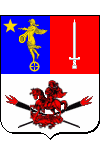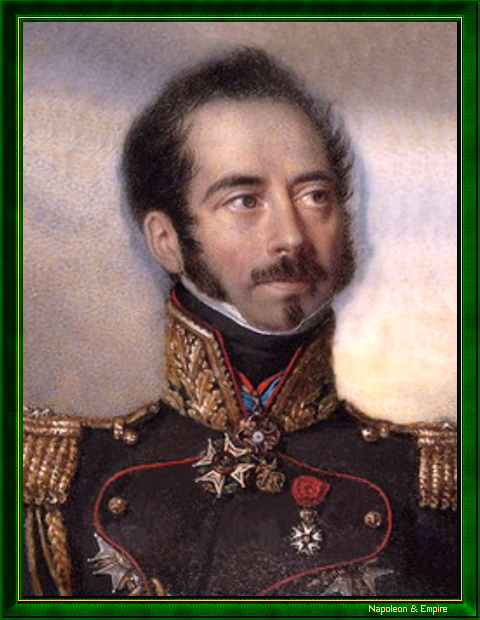Gaspard Gourgaud
Baron of the Empire
Pronunciation:

Born into a family of artists (his father was a musician, his grandfather an actor, as were his aunt and uncle), young Gaspard Gourgaud, born in Versailles on September 14, 1783, briefly considered a career as a painter, but, being more gifted in mathematics, entered the Ecole Polytechnique in 1799 and eventually opted for the military.
After graduating in 1801, he served in Châlons as second lieutenant, then was appointed assistant professor of fortifications in Metz, which suggests that he was a brilliant student. The school's commandant, appointed head of the artillery at the Boulogne camp, then took him with him as aide-de-camp.
In 1805, Gourgaud took part in the Austrian campaign. Although wounded at Austerlitz, he received no promotion. He then took part in the Prussian and Polish campaigns. He was awarded the Legion of Honor cross at Pultusk, made captain after Ostrloenka, and fought at Friedland (June 14, 1807).
1808 found him in Spain, and the following year again in Germany and Austria. A dozen battles later, he was appointed to the Versailles arms factory, where he proposed improvements in the manufacture of rifles and spears, which brought him to the attention of General Clarke, Minister of War. After a successful mission to Danzig, where he was tasked with inventorying the city's resources in the event of conflict with Russia, he was appointed the Emperor's ordinance officer in July 1811.
As his new duties placed him directly under Napoleon's eye, he displayed considerable activity and zeal. It was he who was sent to the Kremlin as a parliamentarian, escorted by a single interpreter, when the army entered Moscow. Unfortunately, he found no one there. It was also he, according to some, who prevented the explosion of a huge cache of Russian gunpowder, which could have killed the Emperor, his retinue and even the entire army. In his Examen critique de l'ouvrage du général Ségur sur la campagne de 1812 (Critical review of General Ségur's work on the 1812 campaign), published in 1825, he himself reduced his exploit to more modest proportions.
Napoleon, however, appreciated his merits sufficiently to make him a knight and then a baron of the Empire, a rare favor when he was still a mere captain.
During the retreat, Gourgaud continued to multiply his activities, twice swimming across the Berezina to observe the enemy, for which he was commended in the army order. Back in France, Gourgaud was rewarded for his dedication and skill with a promotion to battalion commander and, above all, the title of "premier officier d'ordonnance", created especially for him.
He was present at every battle in 1813, even providing the Emperor with the information that led to the victory at Dresden (August 26-27).
Despite two wounds, he proved even more valuable during the ocampaign in Northeast France of 1814. At Brienne (January 29), he shot down a Cossack about to spear Napoleon. He also successfully commanded several military operations around Laon and Reims, a city he was the first to enter on March 14. The following day, he was promoted to colonel.
During the First Restoration, Gourgaud, son of a nursemaid to the Duc de Berry, benefited from the protection of this member of the royal family, retained his rank and became a Chevalier de Saint-Louis.
He nevertheless resumed his service to Napoleon as soon as the latter arrived in Paris. In June, he left for the army at Napoleon's side, and was promoted to general and aide-de-camp on June 17, 1815 (some claim he was not promoted until after his return to Malmaison, and that Louis-Nicolas Davout agreed to backdate the appointment).
After the second abdication, Gourgaud followed the Emperor to Rochefort and then to St. Helena. But he was jealous and violent, and didn't get on well with Napoleon's other companions. First Emmanuel de Las Cases, then Charles-Tristan de Montholon became his pet peeves, and Henri Gatien Bertrand's sage advice failed to improve his sour mood, much to the Emperor's displeasure. With the Emperor's lack of patience and bad temper, their relationship deteriorated and Gourgaud finally decided to leave in March 1818.
Banned from entering France, Gourgaud settled in England until his expulsion, following the publication of a pamphlet he had written on the battle of Waterloo, which was deemed impertinent towards the Duke of Wellington.
In 1821, Gourgaud was allowed to return to France. At first, his activity was mainly literary. With Montholon, he published the Memoirs written on St. Helena, followed by the aforementioned opuscule on the Russian campaign, which led to a duel with general Philippe-Paul de Ségur.
The Revolution of 1830 restored him to active service. He became lieutenant-general in 1835, peer in 1841, and aide-de-camp to Louis-Philippe.
In 1840, under the command of the Duc de Joinville, he took part in the expedition to bring Napoleon's ashes back from St. Helena. There he rubbed shoulders with General Bertrand, Count Louis-Joseph Marchand and Louis-Étienne Saint-Denis, known as the Mameluke Ali, former companions in exile. He carried out that mission with the utmost zeal, although his difficult temperament caused a few storms aboard the Belle Poule.
A member of parliament under the Second Republic, he was deprived of all office by his great man's nephew after the coup d'état of December 2, 1851.
He died in Paris on July 28, 1852. His tomb is in the Père-Lachaise cemetery (23rd division) .
"Baron Gaspard Gourgaud". Anonymous, XIXth century.

A feared swordsman, Baron Gourgaud had several illustrious swords at his disposal: the one carried by Bonaparte at Lodi, offered by the Emperor after his orderly had saved his life at Brienne; and the one carried by the future Emperor at the battle of the Pyramids, left as a souvenir at the time of the first abdication.